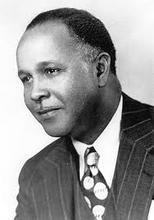Description
Percy Lavon Julian was born April 11, 1899 in Montgomery, Alabama. Growing up in the racially segregated South, Julian was aware of the forces working against him to succeed. Julian attended DePauw and graduated a member of the Phi Beta Kappa honor society. After graduation, he took a teaching position at the respected Fisk University for African Americans in Nashville, Tennessee. Despite racial tensions at Harvard, Julian’s professor and mentor from DePauw convinced Harvard to accept him into their master’s program. In 1923, he graduated from Harvard with his master’s degree and soon after, began teaching chemistry at West Virginia State (then an all-black college) and the well-known Howard University. He then went on to receive his Ph.D. at the University of Vienna, in Austria. Dr. Julian returned to DePauw to pursue research. Through his extensive research and skills in chemistry, Julian was able to develop synthetic physostigmine, a drug used to treat glaucoma. Although he gained national acclaim for this discovery, he still faced discrimination and was not allowed to gain a teaching position due to his race. Nonetheless, Dr. Percy Julian would leave the world of academics to work as the lab director for Glidden Company. There he would gain international acclaim for his work with sterol extraction from soybeans, creation of synthetics for progesterone and testosterone hormones, and synthetic cortisone. He left Glidden in and established Julian Laboratories a year later in 1954. His love for chemistry and research allowed him to make major contributions to the realm of the science world.
Dr. Julian received some the highest awards possible for his work. He was awarded the Spingarn Medal from the NAACP as well as an honorary doctorate from DePauw in 1947. Then in 1968 he received the Chemical Pioneer Award from the American Institute of Chemists and was the first black chemist elected to the National Academy of Sciences in 1973. This was just two years before his death on April 19, 1975 from liver cancer

